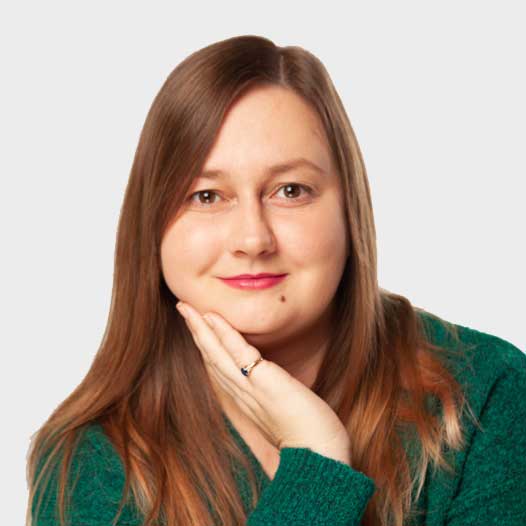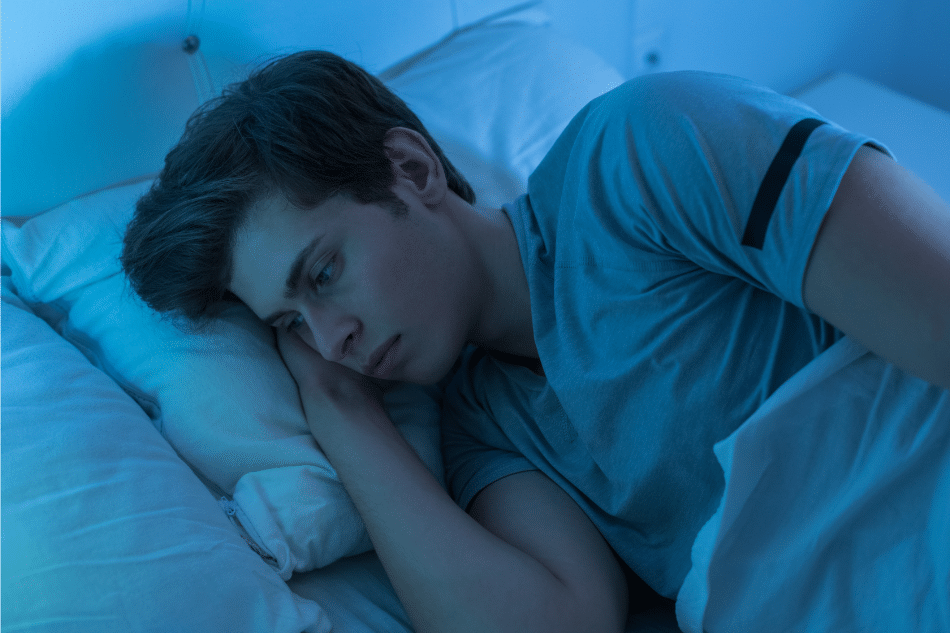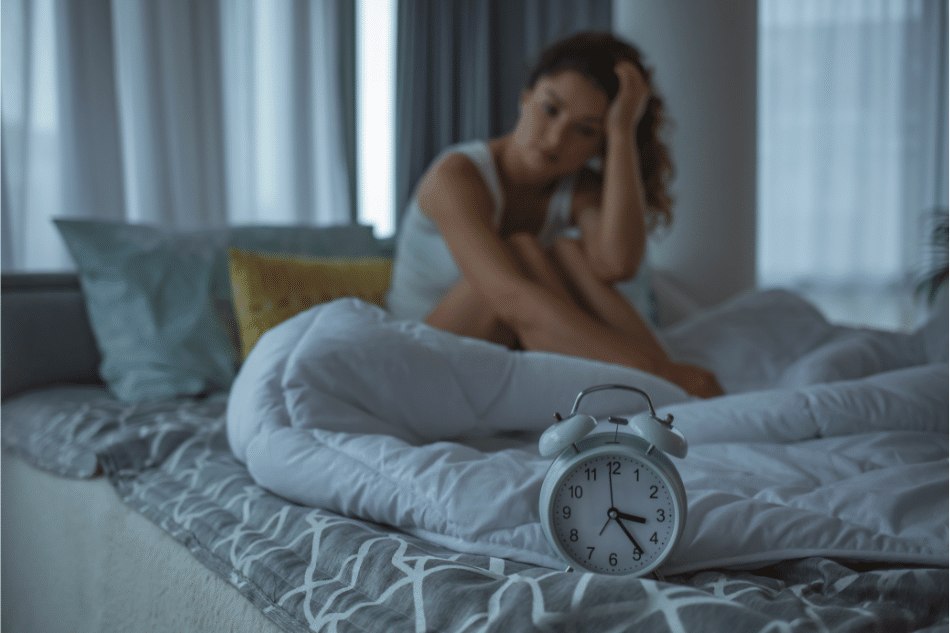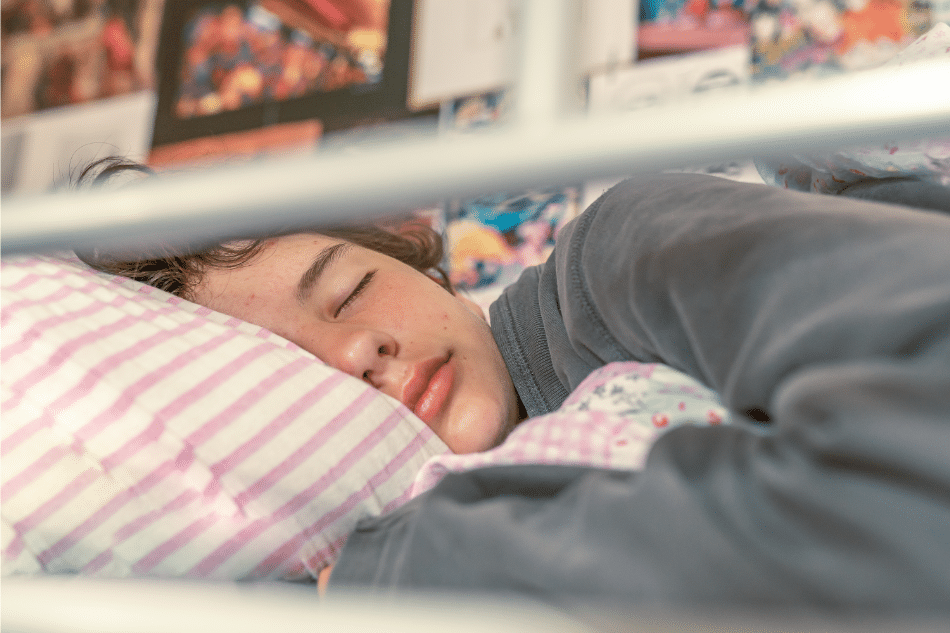SLEEP AIDS FOR TEENAGERS WITH INSOMNIa: understanding your options

Tossing, turning, checking the clock – again. For many teenagers, bedtime has become a battle between exhaustion and an uncooperative mind. You feel drained, but falling asleep just isn’t easy. If this sounds familiar, you’re not alone. Insomnia is surprisingly common in teens, and it’s more than just a bad night’s sleep – it can affect your mood, memory, school work, and even your long-term health.
Adolescence is a time of massive physical and emotional changes, and often those changes can clash with your body’s natural sleep rhythm. Throw into the mix the pressures of school, social media, and friendships, and it’s no surprise that so many teens struggle with sleep.
On this page, we’ll help you understand the different sleep aids for teenagers with insomnia, from simple lifestyle changes to natural supplements, medications, and even sleep therapy. Whether you’re here looking for the best sleep aids for teens with anxiety, a teen struggling to drift off at night, or a parent looking for safe solutions, this guide will walk you through your choices.

Why Teenagers Struggle With Sleep
Teens need eight to ten hours of sleep every night to be at their best – yet eight out of every ten U.S. teenagers don’t get anywhere near this amount.1,2 So, why are they missing this vital sleep time? With so many teens struggling with snoozing, it’s time to find out why it’s so hard to sleep like a baby.
The Biology of Teen Sleep
During teenage years, hormone changes actually shift the body clock forward by a couple of hours, making teens feel sleepier a couple of hours later than normal, turning them from early birds into night owls.3 You may not think this is much of a problem, but what happens if you can’t fall asleep until very late, but still have to get up early for school every day? You’re missing out on that essential sleep.
Lifestyle and Stress
Good sleep doesn’t magically happen on its own – it’s affected by your daily life. A packed school schedule, assignments, chores, sports, social life…stress from these can all contribute to sleepless nights.4 Many teens also plug into their phones or gaming consoles later in the evening to relax, which can, unfortunately, have a knock-on effect, potentially leading to sleep problems from light exposure and stimulation.
Mental Health and Sleep
Mental health challenges like depression and anxiety can go hand in hand with sleep problems.5,6 When stress causes sleepless nights, teenagers using sleep aids for mental health isn’t surprising, especially if it lets them get some much-needed rest. However, while sleep aids for managing teen stress can be a huge help, it’s important to know that they aren’t a cure. Addressing the root cause of the stress or emotional upset is a big part of the picture.
Recognizing the Signs of Insomnia

It’s normal to have the odd restless night, especially if there’s an exam coming up or a big life change happening. When you have trouble sleeping regularly, though, it could be a sign of chronic insomnia.
Occasional sleeplessness often gets better on its own once the short-term stress is over and done with. However, if you consistently have problems drifting off – at least three days each week for more than three months – you might be experiencing chronic insomnia. Some of the most common symptoms of insomnia in teens are:7
Trouble falling asleep
- Wanting to nap in the daytime
- Waking up in the morning is hard
- Finding ways to avoid going to bed
- Problems with remembering things and focusing
- Feeling tired but then feeling awake once you’re in bed
- Wake up a lot during the night and have difficulty getting back to sleep
If you recognize some of these signs, it may be time to find ways to sleep better.
Healthy Sleep Habits
Having healthy sleep habits is a great way to manage insomnia. Making a consistent routine around sleep can make it easier to fall asleep and wake up feeling refreshed. Here are some tips for creating a good sleep routine:8
Stick to a Sleep Schedule: Teens need 8-10 hours of sleep each night, so set yourself a bedtime and a wake time that will let you get these hours in. Stick to it – even on weekends.
- Wind-Down Time: Give yourself a chance to wind down before bed. Do something relaxing or calming, like reading a book or listening to music.
- Reduce Screen Time: Avoid screen time before bed, as the bright lights and notifications can keep you awake.
- No Naps: Try not to nap in the daytime so that you feel tired enough when it comes to getting into bed.
- Exercise Regularly: Exercise can help tire you out ready for sleep. Just don’t start lifting weights right before bedtime – that time is for winding down, remember?
- Set a Sleepy Mood: It can be easier to sleep when our bedrooms are geared toward sleeping and resting. We recommend making sure your mattress and pillow are comfortable and that your room is quiet and dark, to help you sleep better. Try not to spend long parts of the night scrolling on your phone. Instead, turn off your phone, or put it on ‘do not disturb’, so that you can be sure your alarm will wake you in the morning without you getting notifications pinging through the night.
Building up healthy habits can lead to better sleep. But remember, seeing the benefits of these changes can take time, so being consistent and patient will make a big difference.
Prescription Sleep Aids for Teenagers
Sometimes, no matter how hard we try to form healthy sleep habits, we need a little extra help. That’s where prescription sleep aids for teens can come in handy.
Sleep medications are often considered after lifestyle changes (sleep routines, caffeine, screen time, etc…) haven’t been successful, and your sleep issues are causing significant problems with your daily life. A range of prescription medications are available to help treat insomnia in children and teens, including melatonin, antidepressants like trazodone, antipsychotics like quetiapine, nonbenzodiazepines like zolpidem, and benzodiazepines like temazepam.12 Each of them works differently to help you sleep – some help you relax, others target underlying anxiety or mood disturbances that might be affecting your sleep.
All medications come with the potential for risks and side effects. Some of the most common sleep medication side effects in teens from the medications mentioned above are:
Grogginess
- Dry mouth
- Blurry vision
- Constipation
- Dizziness
- Agitation
- Appetite changes
As you can see, there are some potential risks of using sleep aids for teens. Medications like these are typically only used as a short-term solution for sleep problems, and medical supervision is essential. Once you start taking sleep medication, you shouldn’t suddenly stop it because you could experience some unpleasant side effects. Instead, stopping sleep aids safely for adolescents involves gradually reducing the amount of medication that you take.12
It’s important for parents and teens to weigh up the benefits and risks with their doctor before teens are prescribed medication for poor sleep. Prescription sleeping aids are often more effective when combined with a longer-term plan, such as having a healthy sleep routine or using sleep therapies.
Sleep Therapies
For many people, non-medication approaches like sleep therapy provide a safe and effective way to manage insomnia. They can address the root of the problem, such as stress or unhelpful sleeping habits, rather than just treating the symptoms.
Cognitive Behavioral Therapy for Insomnia (CBT-I)
CBT-I is a structured and short-term therapy that helps you discover any negative thoughts or behaviors that are causing problems with sleep and lets you change them. CBT-I is a very effective treatment for chronic insomnia, helping people to fall asleep much quicker and to get back to sleep once they’ve woken up in the night. It typically achieves this within 8 CBT-I sessions.13
CBT-I tackles behavioral elements of sleep (sleep routines, bedtimes, and waking times) as well as the cognitive parts (negative thoughts like “I’ll never fall asleep”), and appears to be just as effective as sleep medications at helping you sleep, without any of the negative side effects.14
Mindfulness and Relaxation Techniques
Using techniques such as mindfulness, relaxation, and guided imagery can also improve your sleep. If you have a racing mind, mindfulness can help you to slow down, while if you tend to feel tense, progressive muscle relaxation exercises can help you let go of the stress of the day that you are holding in your body.15,16
Teen Insomnia Treatment With Non-Prescription Sleep Aids
Alongside prescription sleep aids, there are also non-prescription medication options. Melatonin and other sleep aids for teens can be useful non-prescription sleep aids short-term, but it’s important to understand how they work and whether they are safe for use in teens.
Melatonin for Teens
Melatonin is a natural hormone in your body that is released at night to tell the body it’s time to sleep. It is also sold as a dietary supplement, meaning you can buy melatonin at the health food store without needing a prescription. It also means that it hasn’t been approved for use by the U.S. Food and Drug Administration (FDA).
Melatonin could be used before bed to remind your body that it’s time to sleep, and you can buy it in the form of liquids, gummies, capsules, and tablets in a variety of doses. Because they aren’t regulated medicines, they don’t have specific guidelines on dosage, but it’s a good idea to start as low as possible.9
While it’s generally considered safe for short-term use, there isn’t enough research on its long-term effect on teens, so it should only ever be used under the guidance of your doctor.
Herbal Remedies
Some people use herbal remedies to help them sleep. However, there is conflicting evidence on whether they are really effective. The American Psychiatric Association has said that herbs and dietary supplements aren’t effective for sleep problems, and there are safety concerns about some specific types.8
Certain herbal remedies are thought to help you relax, such as lavender and valerian. Researchers have found that both lavender and valerian, when paired with good sleep routines, can help you sleep better, but can also sometimes interact with other medications.10,11 These studies didn’t look at a large number of people, so the evidence really is limited.
Safe Use of Sleep Aids for Adolescents
Just because a sleep aid is labeled as ‘natural’ it doesn’t automatically mean it is safe for you to use. Always check with your doctor before taking supplements, because they can sometimes interfere with medications you may already be taking. And remember that when it comes to mental health, sleep aids for teens with depression may help with the symptoms of insomnia, but may also mask the underlying issues.
Ultimately, it’s important that, whenever you use sleep aids (or any form of supplement or medication), you follow medical guidance.
Finding the Right Path to Better Sleep
Getting good quality sleep can really help your mental health, and using sleep aids to manage teen sleep disorders is becoming more common. If you’re a parent and you’re worried about a teen, or you’re a teen looking for support with sleeping problems and mental health, seeking advice about treatment options can help take a weight off your shoulders. Mission Prep can support you through this.
At Mission Prep, we are dedicated to helping teens overcome mental health challenges, including sleep issues. We offer a wide range of treatment options to ensure you are supported in a way that feels right for you. Whether you are looking for round-the-clock care and support through a residential treatment program, outpatient services like CBT, or something in between, we can work with you to make a completely personalized plan to help you achieve your goals.
If you’re ready to hit ‘snooze’ on sleepless nights, get in touch today to speak to our friendly team of professionals and find out how we can help you.

References
- National Sleep Foundation. (n.d.). National Sleep Foundation’s Sleep in America poll: Teens’ sleep and mental health are strongly connected. National Sleep Foundation. https://www.thensf.org/wp-content/uploads/2024/03/NSF-Sleep-in-America-2024-Report_final.pdf
- Jenco, M. (2016, June 13). AAP endorses new recommendations on sleep times. American Academy of Pediatrics. https://publications.aap.org/aapnews/news/6630/AAP-endorses-new-recommendations-on-sleep-times
- Suni, E. (2023, October 4). Teens and sleep. Sleep Foundation. https://www.sleepfoundation.org/teens-and-sleep
- Suni, E. (2023, November 16). Stress and insomnia. Sleep Foundation. https://www.sleepfoundation.org/insomnia/stress-and-insomnia
- Johns Hopkins Medicine. (2024, June 20). Depression and sleep: Understanding the connection. https://www.hopkinsmedicine.org/health/wellness-and-prevention/depression-and-sleep-understanding-the-connection
- Suni, E. (2024, April 23). Anxiety and sleep. Sleep Foundation. https://www.sleepfoundation.org/mental-health/anxiety-and-sleep
- Crider, C. (2025, April 14). What to know about insomnia in teens, and what to do about it. Healthline. https://www.healthline.com/health/insomnia/insomnia-in-teens
- American Psychiatric Association. (n.d.). What are sleep disorders? https://www.psychiatry.org/patients-families/sleep-disorders/what-are-sleep-disorders
- Esparham, A. (n.d.). Melatonin for kids: What parents should know about this sleep aid. https://www.healthychildren.org/English/healthy-living/sleep/Pages/melatonin-and-childrens-sleep.aspx
- Guadagna, S., Barattini, D. F., Rosu, S., & Ferini-Strambi, L. (2020). Plant extracts for sleep disturbances: A systematic review. Evidence-Based Complementary and Alternative Medicine, 2020(1). https://doi.org/10.1155/2020/3792390
- Lillehei, A. S., Halcón, L. L., Savik, K., & Reis, R. (2015). Effect of inhaled lavender and sleep hygiene on self-reported sleep issues: A randomized controlled trial. The Journal of Alternative and Complementary Medicine, 21(7), 430–438. https://doi.org/10.1089/acm.2014.0327
- American Academy of Child and Adolescent Psychiatry. (n.d.). Parents’ medication guides. https://www.aacap.org/AACAP/Families_and_Youth/Family_Resources/Parents_Medication_Guides.aspx
- DeAngelis, T. (n.d.). Behavioral therapy works best for insomnia. American Psychological Association. https://www.apa.org/monitor/2016/10/insomnia
- Rossman, J. (2019). Cognitive-behavioral therapy for insomnia: An effective and underutilized treatment for insomnia. American Journal of Lifestyle Medicine, 13(6), 544–547. https://doi.org/10.1177/1559827619867677
- Corliss, J. (2020, June 15). Mindfulness meditation helps fight insomnia, improves sleep. Harvard Health. https://www.health.harvard.edu/blog/mindfulness-meditation-helps-fight-insomnia-improves-sleep-201502187726
- Johns Hopkins Medicine. (2021, October 20). Sleepless nights? Try stress relief techniques. https://www.hopkinsmedicine.org/health/wellness-and-prevention/sleepless-nights-try-stress-relief-techniques













